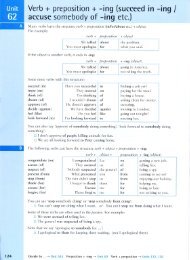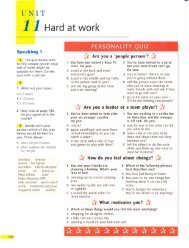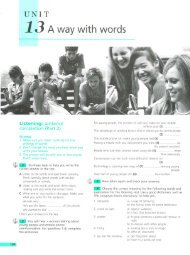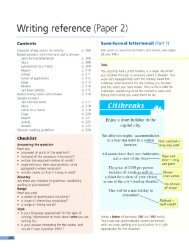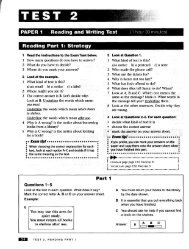fames: 'f ]ur...*bogt.. 100 kilometres off the coast of Australia.'
fames: 'f ]ur...*bogt.. 100 kilometres off the coast of Australia.'
fames: 'f ]ur...*bogt.. 100 kilometres off the coast of Australia.'
You also want an ePaper? Increase the reach of your titles
YUMPU automatically turns print PDFs into web optimized ePapers that Google loves.
I<br />
vo" are going to hear part<br />
<strong>of</strong> a radio programme.<br />
Rachel is a radio reporter<br />
in a studio in London.<br />
She is talking to a man<br />
called James Baker who<br />
is taking part in a round<strong>the</strong>-world<br />
yacht race.<br />
What do you think she<br />
is asking him ............<br />
E m Listen and check if you were right.<br />
E m<br />
Later,Rachel tells a colleague about <strong>the</strong> conversation. Read what Rachel says,<br />
<strong>the</strong>n listen again and fill in <strong>the</strong> gaps with james's actual words.<br />
1 Rachel: James told me he was about L00 <strong>kilometres</strong> <strong><strong>of</strong>f</strong> <strong>the</strong> <strong>coast</strong> <strong>of</strong> <strong>Australia</strong>.<br />
<strong>fames</strong>: <strong>'f</strong> ]<strong>ur</strong>...*b.o.gt.. <strong>100</strong> <strong>kilometres</strong> <strong><strong>of</strong>f</strong> <strong>the</strong> <strong>coast</strong> <strong>of</strong> <strong>Australia</strong>.'<br />
2 Rachel: He said he hadn't seen ano<strong>the</strong>r boat for a few days.<br />
James: 'I ..................... ano<strong>the</strong>r boat for a few days.'<br />
3 Rachel: He said he thought he might win.<br />
James:'I ........................................... win.'<br />
4 Rachel: He said <strong>the</strong>re had been a terrible storm.<br />
James: 'There<br />
a terrible storm.'<br />
5 Rachel: He said he hadn't slept for three days.<br />
James: 'I ..................... for three days.'<br />
6 Rachel: He told me <strong>the</strong> sea was calm, <strong>the</strong> sun was shining.<br />
James: 'The sea calm, <strong>the</strong> sun ...............<br />
7 Rachel: He said that he could sometimes see sharks and dolphins swimming.<br />
]ames: 'I ..................... sometimes see sharks and dolphins swimming.'<br />
135
8 Rachel: He said he would spend two ho<strong>ur</strong>s in a hot bath.<br />
James: 'L.................... two ho<strong>ur</strong>s in a hot bath.'<br />
9 Rachel: He said he had to get his hair cut.<br />
James: 'L.................... hair cut.'<br />
E @I,isten again and complete <strong>the</strong> questions Rachel asked.<br />
1 Rachel: I asked him where he was.<br />
'Where<br />
............'<br />
2 Rachel: I asked him if he thought he was going to win.<br />
'Do you<br />
............ to win'<br />
3 Rachel: I asked him what <strong>the</strong> wea<strong>the</strong>r was like.<br />
'What<br />
............ like'<br />
4 Rachel: I asked him if he could see dolphins <strong>the</strong>re.<br />
dolphins <strong>the</strong>re'<br />
p C"" you see any pattern to <strong>the</strong> changes to <strong>the</strong> tenses in Exercises 3 and 4<br />
136
1 Tense changes in reported speech<br />
When we report what someone else said, we are usually reporting at a<br />
later time so we change <strong>the</strong> tenses used by <strong>the</strong> original speaker:<br />
present simple<br />
+ past simple<br />
'!-l! ry) about <strong>100</strong> hilometres from <strong>Australia</strong>.' ---> He said (that) he uas about L00 kilometes from Ausnalia.<br />
present continuous<br />
'The sun's (k) shining.'<br />
past simple<br />
'There was a tercible storm.'<br />
present perfect<br />
'I hauen't (haue not) seen ano<strong>the</strong>r boat.'<br />
past perfect<br />
'I hadn't (hail not) expeaeil <strong>the</strong> storm.'<br />
am going to<br />
'I'm (I am) goingto win.'<br />
will<br />
'I'll (I <strong>ur</strong>ill) spenil two ho<strong>ur</strong>s in a bath.'<br />
can<br />
'I can see sharks and dolphins.'<br />
may<br />
'I may win.'<br />
might<br />
'I might win.'<br />
must<br />
'I tnust get my hair cut.'<br />
+ past continuous<br />
---> He said (that) <strong>the</strong> sun was shining.<br />
+ pastperfect<br />
---> He said (that) <strong>the</strong>re'd (hail) been a terrible storm.<br />
--t past perfect<br />
---> He said (that) he hailn't (hail not) seen ano<strong>the</strong>r boat.<br />
-+ past perfect<br />
---> He said (that) he hailn't (hail not) expecteil <strong>the</strong> storm.<br />
--> was going to<br />
--> He said (that) he was going to win,<br />
--+ would<br />
---> He said (that) he'il (he woulil) spenil two ho<strong>ur</strong>s in a bath.<br />
-+ could<br />
---> He said (that) he coulil see sharhs and dolphins.<br />
-+ rnight<br />
---> He said (that) he might win.<br />
-+ might<br />
---> He said (that) he might win.<br />
-+ had to<br />
---> He said (that) he hail to get his hair cut.<br />
1fu These verbs do not change when <strong>the</strong>y are reported at a later time:<br />
could, would, should, might, ought to and used to, and verbs in <strong>the</strong> past perfect.<br />
When we report must) we can use ei<strong>the</strong>r must or had to in <strong>the</strong> reported speech<br />
brthad fo is more common:<br />
Kate: must buy some fruit.'<br />
-> Kate said she m.ust /hail to buy sonxe fruit.<br />
A We use must, notha.d to, when we report:<br />
{} a negative:<br />
Paul: 'You rtutstnb tell Sally o<strong>ur</strong> secret.'<br />
--> Paul said we rnustn\ tell Sally o<strong>ur</strong> secret.<br />
i or a deduction:<br />
Sarah: <strong>'f</strong>im must be tired after <strong>the</strong> flight.'<br />
---> Sarah said lim must be tired after <strong>the</strong> flight<br />
L37
2 Reporting in <strong>the</strong> same tense<br />
If <strong>the</strong> reporting verb (e.g. says) is in <strong>the</strong> present tense, we use <strong>the</strong> same<br />
tenses as <strong>the</strong> original speaker:<br />
Amy: 'I'ae missed <strong>the</strong> bus so I'll be a bit late.'<br />
---> Amy says she's missed <strong>the</strong> bus so she'll be a bit late.<br />
If <strong>the</strong> reporting verb (e.g. said) is in <strong>the</strong> past, we sometimes use <strong>the</strong> same<br />
tenses as <strong>the</strong> original speaker if <strong>the</strong> situation is still true:<br />
Robert: 'I ha:ve three sisters.<br />
--> Robert said he has three sisters. or Robert said he hail three sisfers.<br />
Carlo: 'I'm getting married in June.'<br />
If we report what Carlo said before June we can say:<br />
Carlo said he is getting married in June. or Carlo said he utas getting<br />
married in June.<br />
3 Verbs used for reporting<br />
We <strong>of</strong>ten use say to report what somebody said:<br />
He saiil (that) he was going to win.<br />
If <strong>the</strong>re is an object (a noun or a pronoun), sW must be followed by to:<br />
He saiil to rne (that) he was going to win. (notHe-sdd-me..,)<br />
When we use tell to report what someone said, it is always followed by an<br />
object without ro:<br />
He tolil <strong>the</strong>m (that) he was going to win. (not He+old+o+hen... ,<br />
ge+old+het...)<br />
We <strong>of</strong>ten use o<strong>the</strong>r reporting verbs instead <strong>of</strong> say and tell.<br />
Some are nearly always followed by that and usually have no object:<br />
He answereil that ..., He regilieil that ...<br />
Some behave like tell:<br />
He reminiled me (that) ..., He persuad.ed. me (that) ..., He informeil<br />
me (that) ...<br />
Some are nearly always followed by that and sometimes have an object:<br />
He agreeil (with me) that ..., He expilaineil (to rne) that ..., He tnentioned.<br />
(to me) that ...<br />
138
4 Reporting <strong><strong>of</strong>f</strong>ers, advice and promises<br />
After some reporting verbs <strong>the</strong> to infinitive is usually used:<br />
'I'll be a good leader.' ---> He promiseil to be a good leader.<br />
'You should vote for me.' -> He ailaiseil us to aote for him,<br />
'We could help you.' --> They <strong><strong>of</strong>f</strong>ereil to help me.<br />
The infinitive is sometimes used after tell and asle (> see Unit 17):<br />
'Be careful.' ---> I tolil h'hn to be careful.<br />
'Please don't smoke.'--> I askeilher not to stnoke.<br />
5 Reporting questions<br />
Questions are reported using <strong>the</strong> word order <strong>of</strong> a statement ra<strong>the</strong>r than<br />
a question.<br />
Questions with question words (who, what, etc) keep <strong>the</strong>se words when<br />
<strong>the</strong>y are reported:<br />
'How do youfeel'<br />
---> (not Rachel as'leed James how didhe.feel.)<br />
'What's <strong>the</strong> wea<strong>the</strong>r like' ---> Rachel askeil James what <strong>the</strong> wea<strong>the</strong>r utas lilee.<br />
(not )<br />
Yeslno questions are reported with if or whe<strong>the</strong>r:<br />
'Can youhear me'<br />
---> Rachel askeil James if / whe<strong>the</strong>r he could. hear her.<br />
'Is <strong>the</strong> wea<strong>the</strong>r good'<br />
---> Rachel wanteil to know if / whe<strong>the</strong>r <strong>the</strong> wea<strong>the</strong>r was good.<br />
A W. use <strong>the</strong> same struct<strong>ur</strong>e when we ask politely for information:<br />
Can you tell me what time <strong>the</strong> next trainleaaes<br />
I'iI like to know if <strong>the</strong>re's a flight to <strong>Australia</strong> next Th<strong>ur</strong>sday.<br />
6 References to time, place etc.<br />
Unless we are speaking on <strong>the</strong> same day, we have to change references to<br />
time when we report what someone said:<br />
yesterday --> <strong>the</strong> day before<br />
today ---> that day<br />
tomorrow ---> <strong>the</strong> next /following day<br />
next weeLe ---> <strong>the</strong> following<br />
now<br />
weele<br />
---> <strong>the</strong>n<br />
O<strong>the</strong>r changes include:<br />
here -> <strong>the</strong>re<br />
this<br />
---> that<br />
'l sd:w him here yesterday.'<br />
-+ She explained that she had seen him <strong>the</strong>re <strong>the</strong> ilay before.<br />
139
I<br />
Von talk on <strong>the</strong> phone to a friend, Luke.<br />
This is what he says.<br />
1 'I've given up my job.'<br />
2 'I can easily find ano<strong>the</strong>r one.'<br />
3 'I'm going to travel round Africa.'<br />
4 'I lived <strong>the</strong>re as a child.'<br />
5 'I might get a part-time job <strong>the</strong>re.'<br />
6 'I'm packing my bag.'<br />
7 'I'm really excited.'<br />
8 'I'll be away for a year.'<br />
9 'I may stay longer.'<br />
10 'You could come too.'<br />
After Luke has left, you tell ano<strong>the</strong>r friend what he said. Complete <strong>the</strong> sentences.<br />
1 He said he .h*4.. grv..a.n...*P..hi:."rph,........<br />
2 He said he<br />
3 He said he<br />
4 He said he<br />
5 He said he<br />
6 He said he<br />
7 He said he<br />
8 He said he<br />
9 He said he<br />
10 He said I<br />
fl Uatcn <strong>the</strong> beginnings and endings <strong>of</strong> <strong>the</strong>se sentences.<br />
1 She told ...c-..<br />
2 My sister asked ........<br />
3 I said ........<br />
4 My parents said ........<br />
5 I wanted to know ........<br />
6 I told ........<br />
a I could help my neighbo<strong>ur</strong> mend his car.<br />
b whe<strong>the</strong>r my sister could give me a lift.<br />
c me she couldn't afford to come to <strong>the</strong> <strong>the</strong>atre.<br />
d to me, 'You shouldn't watch so much TV.'<br />
e if I wanted to go on holiday with her.<br />
f <strong>the</strong> dentist that Th<strong>ur</strong>sday was <strong>the</strong> only day I was free.<br />
L40
ll<br />
Von ^pply<br />
for a job at a children's holiday camp.<br />
When you meet <strong>the</strong> organiser he asks <strong>the</strong> following questions:<br />
1 Are you married<br />
2 How old are you<br />
3 \,Vhich university are you studying at<br />
4 \,Vhere do you come from<br />
5 Have you worked with children before<br />
6 \t[hat sports do you play<br />
7 Will you work for at least two months<br />
8 Can you start immediately<br />
9 Do you need accommodation<br />
10 Would you like any more information<br />
lYork abroad<br />
We. are looking for<br />
.enthusiastic and lively<br />
f":lg. peopte to work in<br />
L;ltjren s hotiday camf<br />
over <strong>the</strong> summer.<br />
A friend <strong>of</strong> yo<strong>ur</strong>s called Miguel is also going to apply for a job at <strong>the</strong> same camp.<br />
Complete <strong>the</strong> letter, telling him what questions you were asked.<br />
Dear lAiguel<br />
Good luck with tLejob application! llrese are tlp thitgs <strong>the</strong> organiser<br />
asked r e about - he'll yobablg ask gou tl,,e sa.ue sorts <strong>of</strong> questions<br />
t1e asked h,\e .................,...<strong>'f</strong>...1...r,vs.s. .wgrf&,.,..*.. ... (1).<br />
ile wanted to krcw ........ (2),<br />
u/hich untt/erstty<br />
ard u*ere<br />
........ (3) at<br />
.... (4) . llen he asked<br />
(5) with children before<br />
a"t1d u,l,et sports .. (6)<br />
tle wanted t, k** -:-..--"-"---"-<br />
two twnths ard ...............<br />
lle asked<br />
a.rd. unM.erei.<br />
inforuation.<br />
(8) iMwediatelg.<br />
. (9) atcor uodation<br />
.... (10) a./V wore<br />
1r41r
!l e teacher is talking to Andy, a student.<br />
You need to work harder.<br />
You could do well.<br />
Do you study every evening<br />
What time do you go to bed<br />
You won't get good marks.<br />
You spend too much time with yo<strong>ur</strong> friends.<br />
Have you decided on a career yet<br />
Later, Andy tells a friend what <strong>the</strong> teacher said. Complete his sentences.<br />
1 H e said I.. w{4... fp.. tllpr. k...lrr*r.&e. rr........................<br />
ll<br />
3 He wanted to know<br />
4 He wondered<br />
5 He warned<br />
6 He complained<br />
7 He asked............<br />
nead what happened to Suzie <strong>the</strong> o<strong>the</strong>r day. Then write <strong>the</strong> conversation<br />
that she actually had.<br />
I travel to college on <strong>the</strong> same bus every day. The o<strong>the</strong>r day when I got on<br />
<strong>the</strong> bus I realised that I had left my p<strong>ur</strong>se at home and didn't have <strong>the</strong><br />
money for <strong>the</strong> bus fare. But <strong>the</strong> woman sitting behind me told me not to<br />
worry because she would lend me some money. She said <strong>the</strong> same thing<br />
had happened to her <strong>the</strong> day before. I asked her what she had done. She<br />
said someone had lent her <strong>the</strong> fare and she was going to give it back that<br />
day on <strong>the</strong> bus, so she was happy to do <strong>the</strong> same for me. She told me I<br />
could give <strong>the</strong> money back to her <strong>the</strong> following day. I thanked her very<br />
much and told her I was very glad she was <strong>the</strong>re.<br />
woman: .Pqnlt...wa[y.,...1]!!...!-4.n4...yp..q. ..wY^..vmret,......................<br />
Suzie:<br />
Woman:<br />
Suzie:<br />
L42
Use <strong>of</strong> English<br />
Complete <strong>the</strong> second sentence so that it has a similar meaning to <strong>the</strong> first<br />
sentence, using <strong>the</strong> word given. Do not change <strong>the</strong> word given. You must use<br />
between two and five words, including <strong>the</strong> word given. There is an example at<br />
<strong>the</strong> beginning (O).<br />
The to<strong>ur</strong>ist guide said to us: 'Take a map if you go walking in <strong>the</strong> hills.'<br />
advised<br />
The to<strong>ur</strong>ist guicte ...................**.u.:X4...*:...J.9...t*h9....................<br />
in <strong>the</strong> hills.<br />
Rose didn't try to be friendly to us.<br />
made<br />
Rose .............<br />
be friendly to us.<br />
The wea<strong>the</strong>rman forecast that <strong>the</strong>re would be sunshine all day.<br />
shine<br />
The wea<strong>the</strong>rman said: 'The ...............<br />
'l haven't heard from Helen for a long time,' Paul said to me.<br />
told<br />
Paul ..............<br />
a map if we went walking<br />
all day.'<br />
heard from Helen for a long time.<br />
How about going to <strong>the</strong> top <strong>of</strong> <strong>the</strong> tower to look at <strong>the</strong> view<br />
we<br />
Why ...............<br />
to <strong>the</strong> top <strong>of</strong> <strong>the</strong> tower to look at <strong>the</strong> view<br />
'Did you book a room with a balcony' I asked my mo<strong>the</strong>r.<br />
if<br />
I asked my mo<strong>the</strong>r<br />
........ a room with a balcony.<br />
The only person to be late was Lucy.<br />
apart<br />
Everyone<br />
........ was on time.<br />
Jack wanted to know what time <strong>the</strong>y would leave <strong>the</strong> next day to catch <strong>the</strong> train.<br />
we<br />
Jack asked: 'What time ..............<br />
to catch <strong>the</strong> train'<br />
H<strong>ur</strong>ry up, <strong>the</strong> show will be starting in a moment.<br />
about<br />
H<strong>ur</strong>ry up, <strong>the</strong> show<br />
........ start.<br />
k<br />
L43
)<br />
9<br />
9 The little boy said he could dress himself without any help.<br />
I<br />
The little boy said:<br />
......... without any help.'<br />
1O 'Are we meeting David in <strong>the</strong> morning or <strong>the</strong> afternoon' Karen asked.<br />
whe<strong>the</strong>r<br />
Karen wondered<br />
........ in <strong>the</strong> morning or <strong>the</strong> afternoon.<br />
Which,o{:<strong>the</strong> sentences test reported speech<br />
.:,. ,:..,,.1..1 . t.i...r.i ta:,t..i<br />
In thred<strong>of</strong> <strong>the</strong> reported sentences <strong>the</strong> verbs can be replaced rqi&r,fhg<strong>'f</strong>o-lloyl4g,.,, ,',,<br />
1,i<br />
predict;,i .,i i:,,,r*On.*no,e <strong>the</strong> repoqqg,l.lgent*tre$. FqUC<br />
thp!9.-yqfhsr.]:.,,:'...'..,.,.',.,li<br />
t<br />
a<br />
i<br />
I<br />
Writing<br />
Yo<strong>ur</strong> school is thinking <strong>of</strong> starting a film club. You went to a meeting where <strong>the</strong><br />
students talked about how <strong>the</strong> club would be organised and what it would do. Yo<strong>ur</strong><br />
teacher couldn't attend <strong>the</strong> meeting and wants to know <strong>the</strong> students' different<br />
opinions. He has asked you to write a report explaining what was said. Write yo<strong>ur</strong><br />
report in 12G-180 words.<br />
LIA
I Vo., are going to hear a TV chef telling a group <strong>of</strong> people how to cook<br />
something. Look at <strong>the</strong> pict<strong>ur</strong>e below which shows <strong>the</strong> things he<br />
uses. Can you guess what <strong>the</strong> man is going to make<br />
E m Listen and check if you were right.<br />
E m Listen again and fill in <strong>the</strong> gaps. Stop <strong>the</strong> recording when you need to.<br />
7 Conth<strong>ur</strong>e......4Pim... this ...<br />
2 Auoid <strong>the</strong> eggs all at <strong>the</strong> same time ...<br />
3 ... keep all <strong>the</strong> time.<br />
4 ... don'tforget ...................... <strong>the</strong> baking powder ...<br />
5 I recomrnend ...................... sultanas and apricots ...<br />
6 ... if you prefer dates or raisins, that's fine.<br />
7 Some people like ...................... some nuts too ...<br />
8 If you decide nuts, chop <strong>the</strong>m up small.<br />
9 Remember ...................... if <strong>the</strong> fruit cake is ready ...<br />
1O I suggesf ...................... a little lemon juice ...<br />
1l Don't fry ...................... <strong>the</strong> cake ...<br />
'/.,2 ... don't expect much fruit cake left ...<br />
!l Wn"t do you notice about <strong>the</strong> forms <strong>of</strong> <strong>the</strong> verbs you have filled in<br />
L45
I<br />
'l<br />
I<br />
I<br />
s!r!errsi.1n:,- ir_i i.<br />
When one verb follows ano<strong>the</strong>r, <strong>the</strong> second verb can ei<strong>the</strong>r be <strong>the</strong> -ing<br />
form or <strong>the</strong> to infinitive. It depends on <strong>the</strong> first verb.<br />
A aU <strong>the</strong> verbs in this unit marked * can also normally be followed by a<br />
that clause with <strong>the</strong> same meani.g (osee Grammar, part 8).<br />
1 Verb + to infinitive<br />
(cot*l'Afud '*ogygig;:.:'::"' a<br />
' *oranBf'"'.'6tempt i<br />
nunwge ncglect <strong><strong>of</strong>f</strong>u omit pton, prepere - *pretmit<br />
;<br />
:::r: :f ::f**:ffi:: :j<br />
If you ileciile to ailil nuts ...<br />
Don't expect to hante much cake left.<br />
Notice how <strong>the</strong> negative is formed:<br />
If you decide not to ice it ...<br />
The following verbs + ro infinitive always have an object:<br />
ilare ,, ,er{qwage ,f.gtc7,, iwite ,,,,,ordzt<br />
Her fa<strong>the</strong>r taught her to play tennis.<br />
The teacher reminded <strong>the</strong> childreryto bring <strong>the</strong>ir swimming things.<br />
The following verbs + ro infinitive sometimes have an object:<br />
We expecteil to be late. or We expecteil Tom to be late.<br />
We wanteil to stay longer. or We wanteil <strong>the</strong>m to stay longer.<br />
A Woutd like, would loue, would. prefer etc. are also followed by <strong>the</strong><br />
ro infinitive (>See Grammar, part 4).<br />
2 Verb + infinitive without to<br />
Modal verbs (can, could, may, might, must, needn't, shall, should, will,<br />
would), had bexer and would ra<strong>the</strong>r are followed by <strong>the</strong> infinitive<br />
without to (>see also Units 12-14):<br />
You shoulil ailil <strong>the</strong>m slowly.<br />
You needn't incluile mtts.<br />
Help can be followed by <strong>the</strong> infinitive with or without ro:<br />
We helpeil <strong>the</strong>m (to) start <strong>the</strong>ir car.<br />
t+e
Make and let (always with an object) are followed by <strong>the</strong> infinitive<br />
without to:<br />
Let <strong>the</strong> cake cool for half an ho<strong>ur</strong>.<br />
I made my sister help with <strong>the</strong> cooleing.<br />
A ffte passive form <strong>of</strong> make is followed by <strong>the</strong> ro infinitive:<br />
I utas maile to ilo my homework.<br />
3 Verb + -infl<br />
9&fU':af<br />
,,,.,,,,,,feb.|'l$,Q,,,<br />
,:,,', t),;mt<br />
I "nioy<br />
making it.<br />
Aaoiil add,ing <strong>the</strong> eggs ...<br />
Keep iloing this ...<br />
I suggest aililing a little lemon juice ...<br />
Notice how <strong>the</strong> negative is formed:<br />
If you don't leave immediately, you risle not catching yo<strong>ur</strong> plane.<br />
Can you imagine not heuing a car nowadays<br />
4 Verbs + to infinitive ot -inEI (with no difference<br />
in meaning)<br />
atternpt begin can't bear continue hate<br />
,.3:..' ,,..,"3u,:,,',: ,.,;wqry*'::*" i<br />
Contir<strong>ur</strong>c aililing <strong>the</strong> flo<strong>ur</strong>. or Continue to ailil <strong>the</strong> flo<strong>ur</strong>.<br />
I prefer using apricots. or I prefer to use apricots.<br />
I loae making calees. or I loae to make calees.<br />
Two -ing forms do not usually follow each o<strong>the</strong>r:<br />
I was starting to make a calee when <strong>the</strong> phone rang. (not l-ffis-start;ng<br />
@.)<br />
Like + ro infinitive has a slightly different meaning fuomlilee + -ing.<br />
I like to catch <strong>the</strong> early bus on Mondays. (= this is a good plan or it's a<br />
habit, but not necessarily something I enjoy)<br />
I like ilancing. (= I enjoy it)<br />
fr Like, prefer,, hate and loue can be followed by <strong>the</strong> ro infinitive or -ing,but<br />
would like, would prefer, would hate and would loue are always followed by<br />
<strong>the</strong> to infinitive:<br />
She woulil like to go out but we utoulil prefer to stay in.<br />
L47
,i@*+rr!Jrqk;;ii:<br />
5 Verb + to infinitive ot -ingl (with a difference<br />
in meaning)<br />
The following verbs have two different meanings depending on <strong>the</strong> verb<br />
form that follows:<br />
*rwwttber, *fptgrt , ,,<br />
*regret<br />
, try. , sqg<br />
.'.'...<br />
Verb + ro infinitive<br />
Remember to check whe<strong>the</strong>r <strong>the</strong> calee is ready.<br />
(= an action which will be necessary)<br />
Don't forget to ailil <strong>the</strong> baleing powder. (= ry1<br />
action which will be necessary)<br />
I regret to inform you <strong>the</strong>t yo<strong>ur</strong> application<br />
w&s unsuccessful. (= I am sorry to tell you ...)<br />
Try to ice <strong>the</strong> calee quiclely. (= attempt to do it<br />
quickly if you can)<br />
She stoppeil to haae e rest. (= in order to<br />
have a rest)<br />
They don't ,ne&n to up,set you. (= <strong>the</strong>y don't<br />
intend to)<br />
He went on to tell <strong>the</strong>m how to malee a<br />
dffirent cake. (= <strong>the</strong> next thing he did was to<br />
tell <strong>the</strong>m ...)<br />
. wa:ll.',,.,,.,,,,:go,.,tdd,:,r,.<br />
i<br />
Yerb + -ing<br />
I remember cheching that I had my leeys when<br />
I left <strong>the</strong> house. (= a memory <strong>of</strong> a past action)<br />
I'll never forget going to school on my oum for<br />
<strong>the</strong> first time. (= a memory <strong>of</strong> a past action)<br />
We rcgret seniling o<strong>ur</strong> daughter to that school.<br />
(= we wish we hadn't)<br />
Try aililing nuts as it will improve <strong>the</strong> flauo<strong>ur</strong>.<br />
(= as an experiment)<br />
Stop beating when <strong>the</strong> mixt<strong>ur</strong>e is pale and<br />
(= finish doing it)<br />
fl"ffy<br />
If you go by tain that ,neans taking a taxi to<br />
<strong>the</strong> station. (= it involves)<br />
They utent on cycling until <strong>the</strong>y reached <strong>the</strong><br />
farm. (= <strong>the</strong>y continued)<br />
6 Verb + obiect + to infinitive rr1 no obiect + -in{<br />
The following verbs are followed by <strong>the</strong> ro infinitive when <strong>the</strong>y have an<br />
object and by -ingwhen <strong>the</strong>y have no object:<br />
"Yn , ollow f1;rWa ..,p*rnii.,<br />
*rec :i<br />
I recomrnenil using apricots. or I recomntenil you to use apricots.<br />
I ad:vise ad.d.ing nutl or I ailvi.se you to ad.d. nuts.<br />
L4A
7 Verb + -ingl or infinitive without to (with a difference<br />
in meaning)<br />
The following verbs always have an object (<strong>the</strong>se are mainly to do with <strong>the</strong><br />
Notice <strong>the</strong> difference in meaning between verb + -ing and verb + infinitive<br />
without ro:<br />
I uatcheil <strong>the</strong> boys playing football. (= an activity continuing over a period<br />
<strong>of</strong> time)<br />
I utatcheil <strong>the</strong> boy bick <strong>the</strong> football into <strong>the</strong> road. (= short completed action)<br />
She hearil her mo<strong>the</strong>r singing as she came downstairs. (= continuing action)<br />
She hearil <strong>the</strong> doorbell rirg (= a short completed action)<br />
8 Verb + that clause<br />
A11 <strong>the</strong> verbs marked * in this unit can also be followed by a that clause<br />
with <strong>the</strong> same meaning:<br />
I suggest aililing some lemon juice. = I suggest (that) you ailil some<br />
lemon juice,<br />
I recom"menil using subanas and apricots. = I recotnmenil (that) you use<br />
subanas and apricots.<br />
They agreeil to leatte early. = They agrceil (that) <strong>the</strong>y uoulil leaoe early.<br />
9 Adjectives<br />
The following adjectives are usually followed by <strong>the</strong> to infinitive: afraid,<br />
cheap, *dangerous, delighted, *dfficult, *easy, expensiue, hrypy, impossible,<br />
interesting, *nice, pleased, possible, safe, sorry, s<strong>ur</strong>prised:<br />
I'm su"rpriseil to see you here.<br />
The adjectives marked x can sometimes also be followed by -ing with <strong>the</strong><br />
same meaning.<br />
It's nice meeting friends after school.<br />
or /r's nice to meet friends after school.<br />
> See also Unit 22, Grammar, pafi 1. for adjectives followed by a preposition<br />
* -ing or a noun.<br />
a49
'l,J<br />
I *)<br />
)t#t<br />
lftftul *<br />
HM.'<br />
I<br />
Co-plete this conversation using <strong>the</strong> verbs in brackets.<br />
Andy: I've decidea 'Ip...lgye. (leaue) (1) my job next month.<br />
Sally: But I thought you enjoyed<br />
(worle) (2) in an<br />
architect's <strong><strong>of</strong>f</strong>ice.<br />
Andy: Oh, I do. But I feel like ..................... (do) (3) something<br />
different for a while.<br />
Didn't you promise ...................... (stay) (4) <strong>the</strong>re at least<br />
two years<br />
Andy: Yes, I did but I just can't stand (work) (5)<br />
with those people. One <strong>of</strong> <strong>the</strong>m refuses ...................... (stop) (6) talking while she<br />
works, ano<strong>the</strong>r one keeps (si"g (7) to himself. And <strong>the</strong>n <strong>the</strong>re's a man<br />
who attempts ...................... (tell) (8) ar,vful jokes all <strong>the</strong> time which he always gets<br />
wrong. I detest<br />
(worh) (9) with all that noise around me.<br />
Sally: It sounds quite a cheerful place to me. Can't you manage ...................... (ignore) (10)<br />
<strong>the</strong>m and get on with yo<strong>ur</strong> work<br />
Andy: No, I can't. I just can't carry on<br />
I'm hoping<br />
Sally: Well, good luck.<br />
Go) (11) <strong>the</strong>re every day.<br />
(go) (12) abroad for a bit.<br />
fl Una"tHne <strong>the</strong> coruect form <strong>of</strong> <strong>the</strong> verb.<br />
1 I noticed <strong>the</strong> man drop./ dropping / to drop his ticket so I picked it up for him.<br />
2 Tll.e to<strong>ur</strong> guide advised <strong>the</strong> to<strong>ur</strong>ists not talee / taking/ to take too much money out<br />
with <strong>the</strong>m.<br />
3 I heard <strong>the</strong> horses come / coming/to come down <strong>the</strong> lane so I waited for <strong>the</strong>m to pass<br />
before driving on.<br />
4 The old man said he would love haue /hatting / to haue <strong>the</strong> chance to fly in an<br />
aeroplane again.<br />
5 Don't make <strong>the</strong> children come / coming/to come wtth us if <strong>the</strong>y don't want to.<br />
6 I saw <strong>the</strong>boy jump /j<strong>ur</strong>nping/ to jump into <strong>the</strong> lake before anyone could stop him.<br />
7 I recommend phone / phoning / to phone <strong>the</strong> hotel before you set <strong><strong>of</strong>f</strong>.<br />
8 My fa<strong>the</strong>r used to forbid w play / playing / to play in those woods.<br />
9 The college only allows smoke/ smoleing/to smolae in <strong>the</strong> common room.<br />
10 It was my drama teacher who enco<strong>ur</strong>aged me become /becoming/ to become an actor.<br />
150
! fiff in <strong>the</strong> gaps with a suitable verb in <strong>the</strong> correct form.<br />
1 If I go to <strong>the</strong> wedding it will mean .b.r*y.'ng a new dress.<br />
2 Please try ...................... to <strong>the</strong> airport in good time - I'll be nervous waiting for you.<br />
3 Will you stop that noise I'm trying this book.<br />
4 I forgot a table at <strong>the</strong> resta<strong>ur</strong>ant and it was full when we got <strong>the</strong>re.<br />
5 The two children went on ...................... <strong>the</strong>ir ball against <strong>the</strong> wall although <strong>the</strong>y<br />
had been told several times to stop.<br />
6 We regret you that <strong>the</strong> co<strong>ur</strong>se you applied for is now full.<br />
7 Tommy says he didn't come to <strong>the</strong> party because he didn't know about it but I<br />
remember ...................... him.<br />
8 When you go out, remember ...................... <strong>the</strong> key with yo<strong>ur</strong> neighbo<strong>ur</strong> because<br />
I haven't got one.<br />
9 Why don't you try ...................... glasses Then you might not get so many headaches.<br />
10 I saw Philip when I was in <strong>the</strong> park so I stopped ...................... to him.<br />
@<br />
11, I meant you a postcard but I didn't have time.<br />
'1,2 I regret not ...................... to Egypt with my sister because she says it was a really great trip.<br />
13 After getting a degree in biology, my son went on a book about monkeys.<br />
14 I shall never forget <strong>the</strong> sun come up over <strong>the</strong> mountains when I was in <strong>the</strong><br />
Himalayas.<br />
fotty is about to go on a trip to yo<strong>ur</strong> home town. He knows nothing about<br />
yo<strong>ur</strong> country. Complete <strong>the</strong>se sentences grving him some advice.<br />
1 I advise you (visit)........1e...yi:it. -+.k..n*fhgl ..in...9.r..m...-5..td.,..,.,.<br />
2 You'll enjoy (see) ..............<br />
3 Don't miss (go)<br />
4 Before you go, don't forget (buy)<br />
5 While you're <strong>the</strong>re, fiy (eat)<br />
6 You must promise ..................<br />
7 Avoid<br />
8 Remember...................<br />
151
:llirll.lri.lllil!:11.r:!il.i<br />
': l,-J<br />
Use <strong>of</strong> Engllish<br />
For questions 1-15, read <strong>the</strong> text below and decide which answer<br />
(A, B, C or D) best fits each space. There is an example at <strong>the</strong> beginning (0).<br />
o @round B through G across D over<br />
BALLOON ADVENTURE<br />
Brian Jones is <strong>the</strong> British half <strong>of</strong> <strong>the</strong> first team to go (O) ...4.. tne world in a<br />
balloon. He and his Swiss co-pilot have written an account <strong>of</strong> <strong>the</strong> 19-day<br />
expedition <strong>the</strong>y (1)........ in March 1999. lt was an astonishing triumph.<br />
Nobody (21....... <strong>the</strong>m to finish <strong>the</strong> voyage. They (3)........ with poisonous fumes,<br />
temperat<strong>ur</strong>es <strong>of</strong> minus 50 degrees Celsius and an Atlantic crossing with<br />
(4)........ any fuel.<br />
Fo<strong>ur</strong>teen years (5)........ , Brian was a reasonably successful businessman,<br />
(6)........ he tired <strong>of</strong> his f<strong>ur</strong>nit<strong>ur</strong>e business and (7)........ to buy a balloon.<br />
Before long he was one <strong>of</strong> <strong>the</strong> country's (8)........ balloon instructors and pilots.<br />
Why did he risk everything for one trip He says he was not a very confident<br />
child: 'At seven a friend (9)........ me to go down a water slide. I still (1O)........<br />
being absolutely terrified. I couldn't swim and I have never learnt to swim<br />
properly.' He thinks everyone should face <strong>the</strong>ir greatest (11)........ and that<br />
is one reason why he went up in <strong>the</strong> balloon. Six <strong>of</strong> <strong>the</strong> 19 days <strong>the</strong>y were<br />
(L21........ <strong>the</strong> air were spent (13)........ at <strong>the</strong> Pacific Ocean - 8,000 miles<br />
<strong>of</strong> water. Brian says he won't (14)........ to do it again because <strong>the</strong>re are so<br />
many o<strong>the</strong>r things he (15)........ to do.<br />
7. A followed<br />
2 A expected<br />
3 A did away<br />
4 A almost<br />
5 A after<br />
6 Abut<br />
7 A thought<br />
B succeeded<br />
B hoped<br />
B got along<br />
B hardly<br />
B ago<br />
B although<br />
B considered<br />
C performed<br />
C intended<br />
C kept up<br />
G quite<br />
G since<br />
G since<br />
G afforded<br />
D completed<br />
D admitted<br />
D put up<br />
D ra<strong>the</strong>r<br />
D past<br />
Dso<br />
D decided<br />
tsz
'8<br />
9<br />
10<br />
A unique<br />
A demanded<br />
A forget<br />
B preferable<br />
B dared<br />
B remind<br />
G leading<br />
G threatened<br />
C remember<br />
D suitable<br />
D wished<br />
D regret<br />
L7.<br />
L2<br />
13<br />
L4<br />
15<br />
A fears<br />
Aon<br />
A watching<br />
A delay<br />
A wants<br />
B suspicions<br />
Bin<br />
B observing<br />
B imagine<br />
B fancies<br />
G dist<strong>ur</strong>bances<br />
cbv<br />
C seeing<br />
G attempt<br />
G enjoys<br />
D frights<br />
Dto<br />
D staring<br />
D suggest<br />
D appreciates<br />
:'<br />
I<br />
i:<br />
(;<br />
[.<br />
b<br />
i.<br />
r<br />
s.<br />
I<br />
t<br />
!<br />
L'<br />
li.<br />
&<br />
F<br />
s<br />
R<br />
I<br />
a-<br />
153
These are some words from <strong>the</strong> exam task. Without looking back, put <strong>the</strong>m<br />
into <strong>the</strong> right columns.<br />
(€anlt}afFerd adm+ appreciate attempt consider<br />
dare decide delay demand enjoy expect fancy j 1;,,r,,,,',,,:, ,,;,r,<br />
hope imagine suggest threaten want wish<br />
Verbs followedby to infinitive<br />
can'l aFFord<br />
Verbs followedby -ing<br />
ad.mit<br />
Writing<br />
Yo<strong>ur</strong> class has recently had a discussion about how much freedom parents should<br />
allow young people to have nowadays. Yo<strong>ur</strong> teacher has asked you to write a<br />
composition giving yo<strong>ur</strong> own views on <strong>the</strong> following statement:<br />
Young people are given too much freedom nowadays by <strong>the</strong>ir parents.<br />
Write yo<strong>ur</strong> composition in 120-180 words.<br />
75.4
I<br />
Vo,r are going to hear a girl called Donna talking about a pop group she<br />
was in. Look at <strong>the</strong>se pict<strong>ur</strong>es, which show what happened. Read <strong>the</strong><br />
sentences below and put <strong>the</strong>m in <strong>the</strong> correct order according to <strong>the</strong> pict<strong>ur</strong>es.<br />
a Bella, Jo and Zoe made plans without telling Donna. I<br />
b Donna had some problems.<br />
I<br />
c Donna left <strong>the</strong> group.<br />
tr<br />
d Donna was in a pop group with Bella, Jo andZoe. I<br />
e Donna had a row with <strong>the</strong> o<strong>the</strong>r girls. tr<br />
f One night <strong>the</strong> group didn't perform. I<br />
E m Listen and check if you were right.<br />
E rc Read <strong>the</strong> definitions 1-11. They all refer to phrasal verbs which Donna uses.<br />
Listen again and complete <strong>the</strong> phrasal verbs. Stop <strong>the</strong> recording when you need to.<br />
1. separate= . b!'.g*k....r'tp<br />
2 haue a good relationship = ...................... on with<br />
3 rely on = ...................... on<br />
4 support - ...................... up<br />
5 talae care <strong>of</strong> = ...................... after<br />
6 continue = ...................... on<br />
7 cancel = ...................... <strong><strong>of</strong>f</strong><br />
8 meet = ...................... toge<strong>the</strong>r<br />
9 discuss = ...................... over<br />
l0 make sorneone lea.tte =...................... out<br />
1'1. s<strong>ur</strong>rmder = ...................... in<br />
155
L Meanin$ and form<br />
The meaning <strong>of</strong> some phrasal verbs is clear:<br />
I pickeit u.p <strong>the</strong> phone. @icked and up have <strong>the</strong>ir normal meanings)<br />
Many phrasai verbs are idiomatic and you have to learn what <strong>the</strong>y mean.<br />
They may contain <strong>the</strong> same verb but have different meanings, depending<br />
on <strong>the</strong> preposition or adverb which follows:<br />
He tnnneil back because he had left something at honxe. (= changed direction)<br />
He arneil d.own <strong>the</strong> invitation because he was feeling ired. (: refused)<br />
They r<strong>ur</strong>neil u.p unexpectedly. (= arrived)<br />
Some phrasal verbs have several meanings:<br />
She prut on her clo<strong>the</strong>s. (= she got dressed)<br />
She ptt on weight. (= her weight increased)<br />
She put on <strong>the</strong> light. (= she switched <strong>the</strong> light on)<br />
The students put on e play.(= performed)<br />
> See Appendix 1 for a list <strong>of</strong> phrasal verbs you should understand.<br />
The form <strong>of</strong>phrasal verbs canvary.<br />
Some verbs liave two parts: a verb (e.g. do,go) and ano<strong>the</strong>r word<br />
(sometimes called a particle) which can be an adverb (e.g. bacle, out) ot a<br />
preposition (e.g. at, into,, from).<br />
-So*" verbs have three parts: a verb (e.g. come), an adverb (e.g.up) and a<br />
preposition (e.g. against).<br />
Phrasal verbs behave differently depending on whe<strong>the</strong>r <strong>the</strong>y are<br />
a verb + preposition, a verb + adverb, or a verb + adverb + preposition.<br />
2 Verb + preposition<br />
When a phrasal verb consists <strong>of</strong> a verb and a preposition:<br />
r it always has an object.<br />
. <strong>the</strong> obiect (noun or pronoun) always goes after <strong>the</strong> preposition (<strong>the</strong><br />
verb and preposition can't be separated):<br />
The rest <strong>of</strong> <strong>the</strong> group looheil after Donna. (not te*ee+en*s-sf+er)<br />
I counted on f,1ery. @ot eemted+hem-er)<br />
They went oter <strong>the</strong>ir Plang (not @<br />
I really careil about <strong>the</strong>m. (not-eared*em-afu)<br />
3 Verb + adverb<br />
When a phrasal verb consists <strong>of</strong> a verb and its adverb:<br />
o it doesn't always have an obl'ect:<br />
They got togethil every Monday morning.<br />
They carried. on without ma<br />
156
<strong>the</strong> obiect (when it is a noun) can come before or after <strong>the</strong> adverb (<strong>the</strong><br />
verb and adverb can be separated):<br />
They iliiln't back Donna tqt when she was in touble.<br />
or They iliiln't back up Donna.<br />
They wanted to throw Donna out because <strong>of</strong> what she did.<br />
or They wanted to tlwow out Donna.<br />
They calleil negnegryffi or They calleil <strong><strong>of</strong>f</strong> <strong>the</strong> concert.<br />
. <strong>the</strong> object (when it is a pronoun) must go between <strong>the</strong> verb and <strong>the</strong><br />
adverb:<br />
They backeil me up. (not @<br />
They wanted to tlwow nxe out (not th+ew-oat-mQ<br />
They couldnl do <strong>the</strong> concert without her so <strong>the</strong>y call.eil it ffi (notealhed-<strong><strong>of</strong>f</strong>4t)<br />
. <strong>the</strong> object (when it is very long) is usually put after <strong>the</strong> adverb:<br />
They calleil <strong><strong>of</strong>f</strong><strong>the</strong> concert, which had alread)' been postponed twice.<br />
(not )<br />
A Some phrasal verbs have two meanings and take an object with one<br />
meaning and no object with <strong>the</strong> o<strong>the</strong>r meaning, e.g. giue in:<br />
I won't gfu" in until <strong>the</strong>y pay ne what <strong>the</strong>y owe.<br />
(verb + adverb + no object = s<strong>ur</strong>render)<br />
I gaue in mlr homework on time.<br />
(verb + adverb + obiect = hand it to <strong>the</strong> teacher)<br />
[ Some words (e.g. down, in, ffi on, p&st, through, up, etc.) can be ei<strong>the</strong>r<br />
prepositions or adverbs:<br />
She pickeil <strong>the</strong> book uIl or She pickeil up <strong>the</strong> boole.<br />
(verb + adverb can be separated)<br />
She went up <strong>the</strong> stairs. (not wen+++e+ta+s-ap)<br />
(verb + preposition can't be separated)<br />
You can check if a phrasal verb is a verb + preposition or a verb + adverb by<br />
looking in a good dictionary.<br />
4 Verb + adverb + preposition<br />
When a phrasal verb consists <strong>of</strong> three parts:<br />
o it always has an object.<br />
e <strong>the</strong> object (noun or pronoun) always goes after <strong>the</strong> phrasal verb (<strong>the</strong> three<br />
parts can't be separated):<br />
I always got on with <strong>the</strong> o<strong>the</strong>r members <strong>of</strong> <strong>the</strong> group.<br />
... I canne up ageinst some problems ...<br />
I Wt "rp<br />
with this for a while.<br />
They're not going to get qiltay with L.<br />
\-.<br />
L57
Use yo<strong>ur</strong> dictionary to do <strong>the</strong>se exercises if you need to.<br />
I<br />
Co*plete <strong>the</strong>se sentences with words from <strong>the</strong> box to make phrasal verbs with get.<br />
a,{4y,r{ith by donrrn<br />
toiind..',,,1,.' '.i6tnd,,<br />
t0<br />
th'{ou&<br />
,,<br />
ll<br />
1 Simon always manages to get ..............9*t..-0f............. doing <strong>the</strong> washing-up because<br />
he says he has a lot <strong>of</strong> homework.<br />
2 My grandfa<strong>the</strong>r got ............. .... <strong>the</strong> flu very quickly because he's such a fit man.<br />
3 Maria's daughters must be on <strong>the</strong> phone all <strong>the</strong> time because I can never get<br />
when I try to ring her.<br />
4 I tried to take a message but I didn't get ............. .... everything Paula said.<br />
5 Peter hasn't had much success with jobs so far but I'm s<strong>ur</strong>e he'll get .................<br />
in his new one.<br />
6 I finally got ................. watching <strong>the</strong> video <strong>of</strong> a film I recorded two months ago.<br />
7 People think <strong>the</strong>y need lots <strong>of</strong> money but you can get with very little.<br />
8 We don't keep things on <strong>the</strong> top shelf because we can't get ........................................... <strong>the</strong>m<br />
without standing on <strong>the</strong> table.<br />
9 The news <strong>of</strong> Billy and Jane's engagement got ............. .... <strong>the</strong> <strong><strong>of</strong>f</strong>ice very quickly.<br />
10 I can never get ................. telling a lie because my face always goes bright red.<br />
fiff in <strong>the</strong> gaps with phrasal verbs from <strong>the</strong> box which mean <strong>the</strong> same as <strong>the</strong> verbs<br />
in brackets.<br />
,,,<br />
,',,,,<br />
rr.i.r.carfyl, ,r cut dolyn ' fill,id' i puti0ff i<br />
ring up set <strong><strong>of</strong>f</strong> take in t<strong>ur</strong>n down hrrn up<br />
I had been doing <strong>the</strong> same job for years and I didn't really .....q*:f.9..!.9L'. Q4ke) (1) it<br />
any more but it was extremely well paid. Then one day I decided to look for ano<strong>the</strong>r<br />
job, realising I would need to<br />
... (reduce) (2) what I spent on lux<strong>ur</strong>ies.<br />
I ............................. (completed) (3) lots <strong>of</strong> forms but all my applications were<br />
(rejected) (4). I ............ (continued) (5) tooking for a job but nothing suitable<br />
... (appeared) (6) so I booked a holiday. The day before I was due to<br />
... (leaue) (7) I was ... (telephoned) (8) by a TV company who<br />
asked me to go for an interview <strong>the</strong> next day. I ............................. (postponed) (9) my holiday<br />
immediately. It was <strong>the</strong> job <strong>of</strong> my dreams. I could hardly<br />
<strong>the</strong> news when <strong>the</strong>y <strong><strong>of</strong>f</strong>ered it to me. And I never went on that holiday.<br />
... (absorb) (1O'1<br />
158
fl fiff in <strong>the</strong> gaps with <strong>the</strong> correct form <strong>of</strong> verbs in <strong>the</strong> box to make phrasal verbs.<br />
!,r€$, .,,,,corne' do fall ,rgp-t,. ,,Sive ,<br />
go hand look make t<strong>ur</strong>n work<br />
\<br />
\<br />
l<br />
t<br />
Ttre film 0n <strong>the</strong> ftun tells <strong>the</strong> story <strong>of</strong> three woman who is walking through <strong>the</strong> forest<br />
prisoners who manage to ...,.*g*h.... (f)<br />
(7) across <strong>the</strong>m and promises to<br />
out <strong>of</strong> a jail on an island. one <strong>of</strong> <strong>the</strong><br />
prison guards is not very honest. The<br />
prisoners (2) round him by<br />
<strong><strong>of</strong>f</strong>ering him money and he .................... {3)<br />
over some keys. Ttey (4) for a<br />
n€a$y forest and decide to wait <strong>the</strong>re for<br />
a bit because <strong>the</strong>y haven't had time to<br />
(5) out a plan. tAltrite <strong>the</strong>y<br />
(6) over <strong>the</strong> possibilities, a<br />
bring <strong>the</strong>m food each day if <strong>the</strong>y help her<br />
to ...,................ (8) for wood. Ttey ue<br />
hungry and are not very good at<br />
(9) without <strong>the</strong>ir dinner. She is<br />
also vely beautitul so <strong>the</strong>y .................... (10)<br />
in with her idea. But on <strong>the</strong> third day <strong>the</strong><br />
uoman<br />
policeman. $he<br />
(11) up with a<br />
(12) away <strong>the</strong>ir<br />
secret in order to get <strong>the</strong> reward <strong><strong>of</strong>f</strong>ered.<br />
[ " Look up <strong>the</strong> phrasal verbs in italics in a dictionary and,decide if <strong>the</strong>y are aerb +<br />
preposition or uerb + adilerb or uerb + aduerb + prepositi.on. Then decide if <strong>the</strong><br />
underlined noun can go in any o<strong>the</strong>r place and rewrite <strong>the</strong> sentences where possible.<br />
1 I can't gwe up chocolate however hard I try.<br />
Y*erh...L...*4l,-e.r.1p.,...r...q*nlt. .siy.e...c|r:cel*ls...*p....W:s....h+rA...1..-tr.y,..<br />
2 He was so angry hebroke up <strong>the</strong> sculpt<strong>ur</strong>e into small pieces.<br />
3 The girl went ouer her work several times before she was satisfied.<br />
4 We've run out o/biscuits - could you fetch some more<br />
5 I could tell from his expression that he'd made up <strong>the</strong> excuse.<br />
159
6 I can't put up with that noise any longer.<br />
7 llooked after <strong>the</strong> ctrildren while <strong>the</strong>ir mo<strong>the</strong>r was busy.<br />
8 Don't forget to put o<strong>ur</strong> <strong>the</strong> lights when you leave.<br />
9 With her dark eyes and hair, she takes after her fa<strong>the</strong>r.<br />
10 That shop p<strong>ur</strong>s up its prices every month.<br />
Replace each <strong>of</strong> <strong>the</strong> nouns in brackets with a pronoun and rewrite <strong>the</strong><br />
sentences with <strong>the</strong> pronoun in <strong>the</strong> correct place.<br />
I can't give up (chocolate) however hard I try.<br />
I can't aive, tf vD Vfruyvr hrard f. trv.<br />
He was so angry he broke up (<strong>the</strong> sculpt<strong>ur</strong>e) into small pieces.<br />
3 The girl went over (her work) several times before she was satisfied.<br />
4 We've run out <strong>of</strong> (biscuits) - could you fetch some more<br />
5 I could tell from his expression that he'd made up (<strong>the</strong> excuse).<br />
6 I can't put up with (that noise) any longer.<br />
7 I looked after (<strong>the</strong> children) while <strong>the</strong>ir mo<strong>the</strong>r was busy.<br />
8 Don't forget to put out (<strong>the</strong> lights) when you leave.<br />
9 With her dark eyes and hair, she takes after (her fa<strong>the</strong>r).<br />
10 That shop puts up (its prices) every month.<br />
160
Use <strong>of</strong> English<br />
Complete <strong>the</strong> second sentence so that it has a similar meaning to <strong>the</strong><br />
first sentence, using <strong>the</strong> word given. Do not change <strong>the</strong> word given. You must<br />
use between two and five words, including <strong>the</strong> word given. There is an example<br />
at <strong>the</strong> beginning (0).<br />
;f ii,ffiffiii'.; r' li:<br />
,,,;,',,,,,193 .,fto'sl*,ie,.<br />
ieu&d&qbi}d( r'<br />
l'illi.:i<br />
,.., ,as,vell.as.<strong>the</strong> ."r.r.,rrlr'<br />
l'1,',l:,]]:1,<br />
@Sntr.:] l,ti::]li]l<br />
''::.''g,1. :.., ",,.',...t...<br />
.,,. l::l,lt.l, ,.,. :, 1,, , .<br />
],ll.:ll::l<br />
It is essential that all library books are ret<strong>ur</strong>ned by July Sth.<br />
bring<br />
vou .........................l}.tJ..br'ng...h*9f........ alt tibrary books by J<strong>ur</strong>y 5th.<br />
L<br />
Maria had to go away unexpectedly so <strong>the</strong>y postponed <strong>the</strong> wedding for a month.<br />
<strong><strong>of</strong>f</strong><br />
Maria had to go away unexpectedly so <strong>the</strong>y<br />
........ for a month.<br />
It isn't worth asking Philip to tidy up.<br />
point<br />
There's<br />
........ Philip to tidy up.<br />
They decided not to go on holiday after all because <strong>the</strong> baby was ill.<br />
baby's<br />
Because<br />
........ <strong>the</strong>y decided not to go on holiday after all.<br />
I suggest phoning yo<strong>ur</strong> aunt before t<strong>ur</strong>ning up at her house.<br />
you<br />
I suggest<br />
........ yo<strong>ur</strong> aunt before t<strong>ur</strong>ning up at her house.<br />
When I tried to make changes to <strong>the</strong> school timetable, I was faced with a lot <strong>of</strong> opposition.<br />
against<br />
When I tried to make changes to <strong>the</strong> school timetable, I .......................<br />
a lot <strong>of</strong> opposition.<br />
Dr Brown was respected by his grandchildren who all wanted to be like him.<br />
up<br />
Dr Brown's grandchildren .....................<br />
They had just started <strong>the</strong>ir walk when it began to po<strong>ur</strong> with rain.<br />
set<br />
They had just ...............<br />
You'll miss yo<strong>ur</strong> plane if you don't h<strong>ur</strong>ry a bit more.<br />
unless<br />
You'll miss yo<strong>ur</strong> plane<br />
............. him and all wanted to be like him.<br />
<strong>the</strong>ir walk when it began to po<strong>ur</strong> with rain.<br />
........ a bit more.<br />
161
Ji<br />
I -t<br />
9 I really can't bear to live near <strong>the</strong> railway line any longer.<br />
put<br />
I really can't .............<br />
near <strong>the</strong> railway line any longer.<br />
1O Try not to make a mess while you're cooking.<br />
avoid<br />
Try ..................<br />
a mess while you're cooking.<br />
In which <strong>of</strong> <strong>the</strong> sentences is a phrasal verb used<br />
Rewrite <strong>the</strong> following sentences using <strong>the</strong> phrasal verbs from <strong>the</strong> exam task.<br />
i<br />
i<br />
.i<br />
1 They arrived unerpectedly while we were having dinner.<br />
Mt +,Wwn uD dr$t€ u& uwe t'ravrnq diww.<br />
2 By <strong>the</strong> time we started o<strong>ur</strong> jo<strong>ur</strong>ney it was getting dark.<br />
3 I really can't bear to sit in this heat any longer.<br />
4 This desk is for books which are being ret<strong>ur</strong>ned to <strong>the</strong> library.<br />
5 when I'd nearly finished mending <strong>the</strong> car, I was faced with a problem I<br />
6 James had always respected his boss.<br />
7 The play was postponed for a week because tl-re main actor was ill.<br />
L62
Writing<br />
You and yo<strong>ur</strong> school-friends want to have an end-<strong>of</strong>-term party and have decided to<br />
hire a room in a hotel near <strong>the</strong> school. You have <strong><strong>of</strong>f</strong>ered to organise <strong>the</strong> booking.<br />
Read <strong>the</strong> information about <strong>the</strong> hotel and <strong>the</strong> notes you have made on it. You should<br />
cover all <strong>the</strong> points in yo<strong>ur</strong> notes. You may add relevant information <strong>of</strong> yo<strong>ur</strong> own.<br />
CENTRALHOTEL<br />
vailable for hire.<br />
itable for parties.<br />
Big enough fon 50 people How rnoch<br />
Redocfion fon stodents<br />
Onlg snocks wonfed - dnrnks<br />
S<strong>of</strong>undog 30th Jone - stonf 3prn - how<br />
l<strong>of</strong>e con we finishP<br />
Ask obout rnr.tsic - we wonf disco<br />
Write a letter in 120-180 words in an appropriate style. Do not write any addresses.<br />
,i ri<br />
ir:<br />
4t<br />
i<br />
L<br />
163
! Vo,r are going to hear a spy, known as Double X, talking to his boss,<br />
Mr Seymo<strong>ur</strong>, about a photograph which Mr Seymo<strong>ur</strong> gives him.<br />
Mr Seymo<strong>ur</strong> is asking Double X to do something. Before you listen,<br />
guess what he is asking.<br />
f .t'1<br />
;()<br />
{,fr<br />
L64
E m Listen to <strong>the</strong> beginning <strong>of</strong> <strong>the</strong> conversation and check if you were right.<br />
E m Listen to <strong>the</strong> whole conversation and answer <strong>the</strong>se questions.<br />
Play <strong>the</strong> recording twice if you need to.<br />
1 What does Mr Seymo<strong>ur</strong> want Double X to dor Lg...f.p.t!p*r..4..m*n..4n4...fin4...et$-..*!!...*h.*t..him"<br />
2 r{hy doesn't Mr Seymo<strong>ur</strong> give Double X a better photo<br />
5 How is it possible to make <strong>the</strong> pict<strong>ur</strong>e clearer<br />
7 Can you guess who sent <strong>the</strong> photo to Mr Seymo<strong>ur</strong>, and why<br />
E m Listen again and fill in <strong>the</strong> gaps.<br />
1 If you him, I ............ extremely pleased.<br />
2 If we a better pict<strong>ur</strong>e, we ...................... it to you.<br />
3 If she us that, I ...................... to aslc for yo<strong>ur</strong> help.<br />
4 It ............. .... me somewhere to start if I ...................... where she'd phoned from.<br />
5 It ...................... a bit clearer if you at it with yo<strong>ur</strong> eyes half closed.<br />
fl fook at <strong>the</strong> sentences in Exercise 4 and,answer <strong>the</strong>se questions.<br />
1 Look at sentence 5. Which tense is used after if<br />
2 Look at sentence 1. Which tense is used after ifr ...<br />
3 Look at sentences 2 and 4. Which tense is used after if . . . ..<br />
4 Look at sentence 3. Which tense is used after ifr . .<br />
165
Conditional sentences tell us a condition (if ...) and its consequence.<br />
The tenses we use depend on:<br />
r whe<strong>the</strong>r <strong>the</strong> condition and its consequence are real or imaginary.<br />
r whe<strong>the</strong>r <strong>the</strong>y are generally true, or linked to a particular event.<br />
Often <strong>the</strong> condition comes before <strong>the</strong> consequence, but sometimes <strong>the</strong><br />
consequence comes first. When <strong>the</strong> condition comes first, it is followed by<br />
a comma. When <strong>the</strong> consequence comes first, we don't use a comma.<br />
We can divide conditionals into fo<strong>ur</strong> groups.<br />
L Zeto conditional<br />
I/ + present tense, + ptesent tense If you're in hue, aathing else twtu T.<br />
:<br />
Fsent tg{qe, {iro cq.aruat .*;f,* 1ryr"t,tenoe<br />
Nothing else mqtter 6,,i$}e,,in'{4 : :,;":<br />
We use this to state general truths:<br />
If you're in love, nothing else tnatters.<br />
All <strong>the</strong> world seerns wonderful if you're in loue.<br />
If we heat ice, it mehs. = Ice rnelts if we heat it.<br />
2 First conditional<br />
We use this for a condition which we believe is possible:<br />
If youlea:ue me,I'll ilie <strong>of</strong> abroleenheart. (notlfaodllkwe)<br />
I'lllove youforever if youbuy me a diamondring. (not@)<br />
Sometimes we use <strong>the</strong> imperative to express this kind <strong>of</strong> condition<br />
(<strong>the</strong> imperative always comes first):<br />
Learye me and I'll ilie <strong>of</strong> a broLeen hean.<br />
Buy me a diamond ring anil I'll loae you for euer.<br />
3 Second conditional<br />
ii$:{.b :l ;:!1@:.i..i<br />
':''.rltt,,.:'.'..ll'.l.,,..:l,:::,,,.,,':rr:'.:,:'.l,..l<br />
would + verb (no comrna) + if + pa6t tense<br />
,::ff:yall<strong>of</strong>t ma, I wqtld' ilis:'qf |'.,biaken hea$.<br />
,,:',,,fl,, d itic <strong>of</strong> a,'btokenfiaar|Qfyruleft *.<br />
We use this for an imaginary condition, which we believe to be impossible<br />
or very improbable. We use <strong>the</strong> past tense although <strong>the</strong> speaker is thinking<br />
about <strong>the</strong> present or fut<strong>ur</strong>e:<br />
If you left me, I'il (would) ilie <strong>of</strong> a broleen heart. (but I believe you won't<br />
leave me, so my heart is safe)<br />
166
If you uere in love, nothing else woulil ,n&tter. (but I believe you're not in<br />
love, so o<strong>the</strong>r things are important to you)<br />
All <strong>the</strong> world woulil seem wonderful if you were in loue. (bu <strong>the</strong> speaker<br />
believes you're not in love, so everything doesn't seem wonderful)<br />
I'il (woulil) loae you for euer if you bought me a diamond ring. (but I don't<br />
expect you will buy me one, so I may not love you for ever!)<br />
A Witfr.[ we <strong>of</strong>ten rse were instead <strong>of</strong> was in conditional sentences,<br />
especially when we write. It is more formal:<br />
If I was you, I wouldn't phone him.<br />
If I utere you, I would write him a letter.<br />
4 Third conditional<br />
would.hmn + past puticiple (no comrna) I unuldlww ilieit <strong>of</strong> obrokmlwut if yw<br />
+ d/+ past perfect tcnse Mleft me.<br />
We use this to talk about past events which cannot be changed, so we know<br />
that <strong>the</strong> condition is impossible and its consequence is imaginary:<br />
If you'il (hail) left me, I'il (uoulil) harye il,ieil <strong>of</strong> a broleen heart. (bt you didn't<br />
leave me, so I was all right)<br />
If you'il (h"il) been in loue, nothing else would ha:ve mattereil. (but <strong>the</strong> speaker<br />
knows you were not in love at that time, so o<strong>the</strong>r things were important to you)<br />
All <strong>the</strong> world woul.d. ha re seemcil wonderful if you'il (hq.d) been in love. @tt <strong>the</strong><br />
speaker knows you were not in love so everything didn't seem wonderful)<br />
I'il (woulil) ha:ve loaed you for euer if you'il (had) bought me a diamond ring.<br />
(but you didn't buy me one, so I stopped loving you!)<br />
A O<strong>the</strong>r modal verbs Iike might and could are sometimes used instead <strong>of</strong><br />
would in second and third conditional sentences:<br />
I might loue you if you bought me a diamond ring.<br />
I coulil haue loued you for ever if you'd (had) bought nxe a diamond ring.<br />
5 Mixed conditionals<br />
We sometimes meet sentences which contain a mixt<strong>ur</strong>e <strong>of</strong> second and third<br />
conditionals because <strong>of</strong> <strong>the</strong>ir particular context:<br />
If nV boyfriend gax,e nxe diamonds like that, I'd ha:ue mamieil him by now.<br />
(=<br />
-y boyfriend does not give me diamonds like that so I haven't married him)<br />
If <strong>the</strong> wea<strong>the</strong>r hail been fine last weele, <strong>the</strong>re uould be roses in ,ry garden.<br />
(= <strong>the</strong> wea<strong>the</strong>r was bad last week so <strong>the</strong>re are no roses in my garden now)<br />
Lesley would.n't hante misseil <strong>the</strong> bus if she was better organised.<br />
(= Lesley missed <strong>the</strong> bus because she is a badly organised person)<br />
L67
I<br />
uatch <strong>the</strong> beginnings<br />
ll<br />
if she wasn't such a jealous type.<br />
1 If Sally opens that door, ..9..<br />
a<br />
10 If you were as handsome as a film star, ........ t if <strong>the</strong> guests hadn't been careless.<br />
2 If Mike had listened to his fa<strong>the</strong>r, ........<br />
b I'd probably have lots <strong>of</strong> boyfriends.<br />
3 I would quite like Juno<br />
........<br />
c <strong>the</strong>y usually wait until <strong>the</strong>ir<br />
parents go out.<br />
4 If Dave didn't work so much, ........ d and you'll never forget his face.<br />
5 We would have arrived early ........ e he wouldn't have got into uouble.<br />
6 If I was as lovely as Nancy, ........ f I still wouldn't love you!<br />
7 If teenagers want to have a pafty, ........ g she'll get a nasty s<strong>ur</strong>prise.<br />
8 The house wouldn't have been such a mess ........ h if <strong>the</strong> roads had been less busy.<br />
9 Take one look at Alan ........ i he wouldn't get so tired.<br />
f"t <strong>the</strong> verbs in brackets into <strong>the</strong> correct form.<br />
1 I won't help you with yo<strong>ur</strong> homework if you .........49n1t..1i4y-... (not ti.d.y) yo<strong>ur</strong> bedroom.<br />
2 You'll need a visa if you ............... .. (want) to travel to China.<br />
3 If he (carc) about o<strong>the</strong>r people's feelings, he wouldn't behave that way.<br />
4 She (not be) successful if she doesn't learn to conuol her temper.<br />
5 If I'd known you were such a gossip, I ...................... (not tell) you my secret.<br />
6 They would work harder if <strong>the</strong>y (not be) so tired.<br />
7 The boss .............. ... (be) f<strong>ur</strong>ious if he'd found out what you were up to.<br />
8 If <strong>the</strong> temperat<strong>ur</strong>e ..................... (fall) below freezing, water t<strong>ur</strong>ns to ice.<br />
9 If <strong>the</strong>y ................. (not expect) delays, <strong>the</strong>y wouldn't have set <strong><strong>of</strong>f</strong> so early.<br />
L0 Open <strong>the</strong> envelope and we ................. (discouer) what John has been doing.<br />
168
! Co-plete <strong>the</strong> sentences for each pict<strong>ur</strong>e using <strong>the</strong> third conditional,<br />
to show how missing her bus one day resulted in a new iob for Zoe.<br />
't<br />
)<br />
If she hadn't missed her bus, she wouldn't|l9y.9.5.0.re....n!9.<br />
If <strong>the</strong>re had been a free table, she<br />
tVv, aFd,.<br />
3<br />
....................., she wouldn't have had to wait for her c<strong><strong>of</strong>f</strong>ee.<br />
4<br />
man's paper.<br />
5 If she hadn't noticed <strong>the</strong> advertisement,<br />
!l Co-plete <strong>the</strong>se sentences, using yo<strong>ur</strong> own ideas.<br />
1 If I was incredibly good-looking .rny...fr..,.qn49. qr9*14...k;q*!g*:5-..fi..,r%,.<br />
169
-1,1<br />
riii;;l*elre!e!!:.ii:|i;:;1lir3rr;',l9!gs6t<br />
Reading<br />
You are going to read a magazine article about a young woman who works in a n<strong>ur</strong>sery<br />
school. Seven paragraphs have been removed from <strong>the</strong> article. Choose from <strong>the</strong><br />
paragraphs A-H <strong>the</strong> one which fits each gap (1-6). There is one extra paragraph which<br />
you do not need to use. There is an example at <strong>the</strong> beginning (O).<br />
G HAIU G ES I il*i,':'l#n,'*lf,n'.',Hl-l'il# ffl.'<br />
I really love my job, it makes me feel good at<br />
<strong>the</strong> beginning <strong>of</strong> every week, because I love<br />
working with smatt children and I enjoy <strong>the</strong><br />
challenges that arise. But I also think what I do<br />
is something worthwhiie and <strong>the</strong>re was a time<br />
when I thought I would never have that sort <strong>of</strong><br />
career.<br />
But in my final term I started thinking what I<br />
might do and I realised that I didn't have much<br />
to <strong><strong>of</strong>f</strong>er. If I'd worked harder, I would have had<br />
better grades, but it was too late. I just<br />
accepted that I wasn't <strong>the</strong> type to have a career.<br />
1<br />
Their fa<strong>the</strong>r worked abroad and <strong>the</strong>ir mo<strong>the</strong>r<br />
had some high-powered job in an ins<strong>ur</strong>ance<br />
company. I did most <strong>of</strong> <strong>the</strong> housework and I had<br />
a lot <strong>of</strong> responsibility for <strong>the</strong> children although<br />
I was only sixteen.<br />
t+<br />
2 6<br />
$.'.'<br />
Anyway, one Sunday, I was in <strong>the</strong> park with<br />
<strong>the</strong>m, while <strong>the</strong>ir parents were on yet ano<strong>the</strong>r<br />
business trip, and I met this girl Megan I used<br />
to go to school with. We weren't particularly<br />
friendly before, but she asked me what I was<br />
doing, so we got chatting.<br />
4<br />
I thought you couldn't do co<strong>ur</strong>ses if you didn't<br />
have all sorts <strong>of</strong> exams from schoot, but she<br />
persuaded me to phone <strong>the</strong> local college and<br />
<strong>the</strong>y were reatiy helpfut. My experience counted<br />
for a lot and I got on a part-time co<strong>ur</strong>se.<br />
15,:<br />
But it was worth it in <strong>the</strong> end. Now Ite got a<br />
futt-time job. Most <strong>of</strong> <strong>the</strong> children in this school<br />
come from families where <strong>the</strong>re are problems,<br />
unemployment, poor housing and so on.<br />
The problems began really when I agreed to live<br />
in, so that I would be <strong>the</strong>re if my boss had to go<br />
out for business in <strong>the</strong> evening. What was<br />
supposed to happen was, if I had to work extra<br />
ho<strong>ur</strong>s one week, she'd give me time <strong><strong>of</strong>f</strong> <strong>the</strong> next.<br />
I shall always be grateful to Megan. If I hadn't<br />
bumped into her, I would have stayed on where<br />
I was, getting more and more fed up. I wish I'd<br />
reatised earlier that you can have a real career,<br />
even if you aren't top <strong>of</strong> <strong>the</strong> class at school.<br />
L70
A<br />
I had to leave my job with <strong>the</strong> family, but I<br />
got work helping out at a n<strong>ur</strong>sery school. I<br />
was really short <strong>of</strong> money and I even had<br />
to get an evening job as a waitress<br />
sometimes.<br />
B<br />
I find that <strong>the</strong> work we do helps in lots<br />
<strong>of</strong> ways. The children benefit, but also<br />
<strong>the</strong> parents. lt gives <strong>the</strong>m time to sort things<br />
out, go for training, or job interviews and<br />
so on.<br />
c<br />
But unfortunately, it didn't <strong>of</strong>ten work out. I<br />
was getting more and more tired and fed<br />
up, because I had too many late nights and<br />
early mornings with <strong>the</strong> little ones. I felt<br />
trapped, because if I walked out <strong>the</strong>re<br />
wouldn't be anyone to look after <strong>the</strong>m.<br />
D<br />
Then I thought, well, I've spent every<br />
holiday for <strong>the</strong> past five years helping my<br />
mum - I've got two little bro<strong>the</strong>rs and a<br />
little sister, all much younger than me. So I<br />
found myself a job as a nanny, looking after<br />
two little girls.<br />
E<br />
It wasn't too bad at first, because I was<br />
living at home and my mum gave me advice<br />
and looked after me when I got home<br />
exhausted. And it felt great to be earning.<br />
F<br />
I was telling her how I loved <strong>the</strong> kids but<br />
hated <strong>the</strong> job and she said, if you want to<br />
work with children, you ought to do a<br />
co<strong>ur</strong>se and get a qualification.<br />
G<br />
The following year I gained a f<strong>ur</strong><strong>the</strong>r<br />
certificate which means I could apply for<br />
<strong>the</strong> post <strong>of</strong> deputy if it became vacant, or<br />
even transfer somewhere else if I want to.<br />
H<br />
I wasn't very good at school. I mean, I<br />
didn't like studying much, so I didn't try<br />
very hard. I thought I was <strong>the</strong> sort <strong>of</strong><br />
person who couldn't do schoolwork, I<br />
suppose. I was just impatient to leave as<br />
soon as I could.<br />
L7L
I<br />
I<br />
r<br />
Writing<br />
You are going to England for a few months with a friend. You need to find somewhere<br />
to stay. You have found some information and have written some notes on it.<br />
Write to yo<strong>ur</strong> friend giving yo<strong>ur</strong> opinion <strong>of</strong> <strong>the</strong> different places. Say what you can do<br />
if you stay in each place. Write a letter in 120-180 words in an appropriate style.<br />
Do not write any addresses.<br />
The Lion Hotel<br />
Smallfriendly hotel in city centre,<br />
popular with visitors from overseas.<br />
All rooms with private facilities.<br />
convetrret* Lo be rn catLre<br />
€,xP€)\stv€.<br />
breakfast. Tel 357103.<br />
qnod" wu.6<br />
Lo vne,c,L<br />
VeoVlo<br />
Rooms in family house<br />
Two single rooms. Breakfast<br />
and evening meal provided.<br />
€350 per person per month<br />
including heating and laundry.<br />
STUDENT FLATS Livingfoom,<br />
roorn<br />
twin beds.3 kns ctry<br />
eentrs. L0 minutes bus stop.<br />
f250 psr month. Electrieity<br />
extra. Phone 975332.<br />
oa,r" cooL or,
I<br />
Vo,r are going to hear a man talking to a group <strong>of</strong> people about something <strong>the</strong>y are<br />
going to do <strong>the</strong> next day. Here are some <strong>of</strong> <strong>the</strong> things <strong>the</strong>y will take with <strong>the</strong>m.<br />
What do you think <strong>the</strong>y are going to do<br />
E m Listen and check if you were right.<br />
E m<br />
1<br />
2<br />
3<br />
4<br />
5<br />
6<br />
7<br />
8<br />
Listen again and fitl in <strong>the</strong> gaps. Stop <strong>the</strong> recording when you need to.<br />
We're going ...............$119..5..5 <strong>the</strong> wea<strong>the</strong>r gets much worse.<br />
six o'clock.<br />
that it doesn't snow too heavily tonight, I'11 see you back here at<br />
We won't reach <strong>the</strong> top <strong>of</strong> <strong>the</strong> mountain<br />
You need a whistle<br />
you didn't bring large cameras.<br />
we set out early.<br />
you get separated from <strong>the</strong> rest <strong>of</strong> <strong>the</strong> group.<br />
we all stay toge<strong>the</strong>r, we'll have a great time.<br />
I ...................... you'd come a few weeks ago.<br />
we had dinner now.<br />
!l fook at sentence s "1., 21 3, 4 and 6 in Exercise 3. What do you notice about <strong>the</strong> tense <strong>of</strong><br />
<strong>the</strong> verbs which follow <strong>the</strong> words in <strong>the</strong> gaps<br />
L74
L Unless<br />
Unless means if not and is used with <strong>the</strong> present tense to talk about <strong>the</strong><br />
fut<strong>ur</strong>e (in <strong>the</strong> same way as ifl. Unless can usually be replaced by if not:<br />
We're going unless <strong>the</strong> wea<strong>the</strong>r gets much worse. (= if <strong>the</strong> wea<strong>the</strong>r doesn't<br />
get much worse)<br />
We won't have time to reach <strong>the</strong> top <strong>of</strong> <strong>the</strong> mountain unless we set out early.<br />
(= if we don't set out early)<br />
Unless you ilriae more slowly, I'll be sick. (= if you don't drive more slowly)<br />
2 In case<br />
In case shows an action is taken because <strong>of</strong> something else that might<br />
happen.<br />
We use in case with <strong>the</strong> present tense to talk about something which might<br />
happen in <strong>the</strong> fut<strong>ur</strong>e:<br />
Take a whistle in case you get separated. (= <strong>the</strong>re's a chance you might get<br />
separated and a whistle will help us find you)<br />
Take my phone number in case you miss <strong>the</strong> bus (= I expect you'll get <strong>the</strong><br />
bus, but if you miss it, you'll need to phone me)<br />
We use in case with <strong>the</strong> past simple to explain an action:<br />
He toole his s<strong>ur</strong>fboard in case <strong>the</strong>y went to <strong>the</strong> beach.<br />
(= he took his s<strong>ur</strong>fboard because he thought <strong>the</strong>y might go to <strong>the</strong> beach)<br />
In case can also be followed by <strong>the</strong> present perfect:<br />
I'll buy some extra food in case <strong>the</strong> uisitors hale already arciaeil.<br />
h In case does not mean <strong>the</strong> same as f Compare:<br />
I'll coole a meal in case Sarah cornes ouer tonighf. (= I'll cook a meal now<br />
because Sarah might visit me later)<br />
I'll coo'le a meal if Sarah cornes over tonight. (= I won't cook a meal now<br />
because Sarah might not visit me)<br />
3 Provided/ proyiding that and as/ so long as<br />
These expressions are used with a present tense to talk about <strong>the</strong> fut<strong>ur</strong>e.<br />
They have a similar meaning to f<br />
As long &s we all stay toge<strong>the</strong>r, we'll haue a gre&t tirne.<br />
Prouiileil that it iloesn't snow too heauily, I'll see you here at six o'clocle.<br />
h If, unless, in ce.se, prouided/ prouiding that and as/ so long as are all<br />
followed by <strong>the</strong> present tense to talk about <strong>the</strong> fut<strong>ur</strong>e. Some adverbs<br />
(when, until, after, before, as soon as) are also followed by <strong>the</strong> present tense<br />
to talk about <strong>the</strong> fut<strong>ur</strong>e (> see Unit 6).<br />
L75
4 I wish and if only<br />
I wish means <strong>the</strong> same as if only. If only is less common and is usually<br />
stronger.<br />
Wish/if only * th. past simple is used when we express a wish:<br />
r about a present situation:<br />
I wish youloaed me. (= but you don't love me)<br />
I wish I hail lots <strong>of</strong> money. (= but I haven't got lots <strong>of</strong> money)<br />
If only he could driue. (= but he can't drive)<br />
A Notice that we use <strong>the</strong> past tense, although we are talking about now.<br />
We can rse were instead <strong>of</strong> was after .[ and he / she / it:<br />
I wish I was /were cleuer like you. (= but I'm not clever)<br />
I wish <strong>the</strong> wea<strong>the</strong>r wasn't / weren't so wet here. (= but it is wet)<br />
Wish / if only * <strong>the</strong> past perfect is used when we express a wish or regret:<br />
r about <strong>the</strong> past. It's like <strong>the</strong> third conditional - <strong>the</strong> event can't be changed:<br />
She wishes she'il fuail) neuennet hi*. (= but she did meet him)<br />
I wish we'il (hail) come a few weeks ago. (= but we didn't come)<br />
If only I hailn\ brohen his heart. (= but I did break his heart)<br />
Wish/ if only + u,ould, is used when we express a wish:<br />
o for something to happen:<br />
I wish <strong>the</strong> train woulil amiue.<br />
If only <strong>the</strong> rain woulil stopl<br />
t for someone to do something (<strong>of</strong>ten when we are annoyed):<br />
I wish you wouldn't leaae yo<strong>ur</strong> bag in <strong>the</strong> doorway.<br />
I wish <strong>the</strong> waiter woulilhuny up.<br />
A Notice <strong>the</strong> difference between I hope + will and I wish + would when<br />
talking about <strong>the</strong> fut<strong>ur</strong>e:<br />
I hope he will phone. (= <strong>the</strong>re's a good chance he will phone)<br />
I wish he woulil Tthone. (= it's unlikely he will phone)<br />
5 lt's time and IA ra<strong>the</strong>r<br />
These expressions are followed by <strong>the</strong> past tense with a present meaning:<br />
It's thne ute a.te dinner now.<br />
I'il ra<strong>the</strong>r you il'iiln't bring large cameras.<br />
6 O<strong>the</strong>rwise and or else<br />
These words mean 'because if not' and <strong>the</strong>y always go in <strong>the</strong> middle <strong>of</strong> a<br />
sentence. We use <strong>the</strong>m when we feel s<strong>ur</strong>e about something:<br />
I have to go to bed early, o<strong>the</strong>rwise I get too tired. (= if I don't go to bed early,<br />
I get too tired)<br />
Carry that tray with both hands or else you'll drop it. 1= 1l you don't carry it<br />
with both hands, you'll drop it)<br />
L76
I<br />
ne*rite <strong>the</strong>se sentences using unless instead <strong>of</strong> if not.<br />
Sam will pass his driving test if he doesn't drive too fast.<br />
-5..*n..rpt[...p.*:5..hre...4!:iyh9..-t-4.:1...*nl.s.s.': ..W...Ar:::tgt...J.qg...f.qst,<br />
They'llbe here soon if <strong>the</strong>ir plane isn't delayed.<br />
3 If you're not in a h<strong>ur</strong>ry, you could take <strong>the</strong> bus.<br />
4 I won't be able to come to see you tomorrow if my bro<strong>the</strong>r can't give me a lift.<br />
5 If <strong>the</strong> factory doesn't increase its production, it will close down.<br />
6 If you don't write yo<strong>ur</strong> address down for me, I'11 forget it.<br />
7 I won't stay in that hotel if it hasn't got a good resta<strong>ur</strong>ant.<br />
8 If I don't hear from you, I'11 meet you at six.<br />
I<br />
niff in <strong>the</strong> gaps with in case or if.<br />
1,<br />
2<br />
3<br />
4<br />
5<br />
6<br />
7<br />
8<br />
Elaine will post <strong>the</strong> letters .........f......... she goes out.<br />
I'll go for a swim<br />
I finish college early.<br />
I'll teach you to winds<strong>ur</strong>f<br />
I always leave <strong>the</strong> answerphone on when I go out<br />
phone call.<br />
I'll take Tim's address with me<br />
O<strong>ur</strong> team will win <strong>the</strong> match<br />
It's a good idea to have two address books<br />
I'll leave <strong>the</strong>se videos here<br />
you teach me to play golf.<br />
I miss an important<br />
I have time to visit him while I'm in London.<br />
o<strong>ur</strong> goalkeeper plays like he did last week.<br />
you lose one <strong>of</strong> <strong>the</strong>m.<br />
you have time to watch <strong>the</strong>m.<br />
LN
ll<br />
Cnto. is on holiday in a foreign city. She was so busy admiring <strong>the</strong> sights<br />
that she has got lost. What does she wish Write sentences wit}l' wish.<br />
1 I haven't got a map.<br />
6 I'm hot and thirsty.<br />
2 The streets all look <strong>the</strong> same.<br />
oo oo oo<br />
7 I came here alone.<br />
oo oo oo<br />
3 I didn't bring my mobile phone. 8 I need someone to help me.<br />
4 I can't speak <strong>the</strong> language.<br />
9 I'm sorry I came here.<br />
5 I didn't buy a phrase book.<br />
oo oo oo<br />
10 I want to be back in my hotel.<br />
L78
!l nead this email. Fill in <strong>the</strong> gaps with <strong>the</strong> correct form <strong>of</strong> <strong>the</strong> verbs in <strong>the</strong> box.<br />
You need to make some <strong>of</strong> <strong>the</strong> verbs negative.<br />
be, :,,,be,,:, behave ' bring can, chan#<br />
i ,,:, :.::; -, ,.,. .,. ,,1.,:rr:''<br />
fioith, ,, ,*,.<br />
ktrn,,.,,,-!<br />
,,,,,i<br />
Itl- Joe<br />
I'm havin€t a birthday party on Sat<strong>ur</strong>day in my uncle's<br />
f lar. r wish r ..................1f94................ (1) a bisrsrer f lat but r<br />
haven't. Anlnray, my uncle has <strong><strong>of</strong>f</strong>ered me his flat<br />
so long as <strong>the</strong>re<br />
(2) no more than thirty<br />
peopl-e and provided that <strong>the</strong> party.................... (3) bV<br />
midnight. So please come and bring a friend, but I'd<br />
ra<strong>the</strong>r you ..............<br />
... (4) uat<strong>the</strong>w with you because he<br />
always causes trouble. I wish he ................. (5) to<br />
behave bett,er. I had to work hard to persuade my<br />
uncle and unless everyone<br />
(6) well, he<br />
won't let me do it again.-I'11 send. you a map in case<br />
you .............. ... (7) tne street where my uncLe lives.<br />
If you (8) ffnd it, just ring me on my<br />
mobile. So I'l-l- see you on Sat<strong>ur</strong>day unless my uncle<br />
(9)his mind! By <strong>the</strong> way, has Sally<br />
changed her phone number I can't get hold <strong>of</strong> her.<br />
r wish r ..................... (10) rude to her last week, as<br />
she's not speaking to me now.<br />
Bye for now.<br />
Robin<br />
L79
Listening<br />
@@<br />
You will hear people talking in eight different situations. For questions 1-8,<br />
choose <strong>the</strong> best answer, A, B or C.<br />
1 You hear a woman telling someone about a film she has seen. What kind <strong>of</strong> film was it<br />
A a thriller<br />
B a love story<br />
G a comedy<br />
[m<br />
You overhear a conversation in a resta<strong>ur</strong>ant. What is <strong>the</strong> man complaining about<br />
A <strong>the</strong> food<br />
B <strong>the</strong> service<br />
C <strong>the</strong> noise<br />
You hear a woman talking to a colleague. How did <strong>the</strong> woman feel<br />
A upset<br />
B ashamed<br />
G shocked<br />
You overhear a man talking to a friend on <strong>the</strong> phone. What was damaged<br />
A a piece <strong>of</strong> sports equipment<br />
B a musical instrument<br />
G a piece <strong>of</strong> f<strong>ur</strong>nit<strong>ur</strong>e<br />
You hear a couple planning to meet. When will <strong>the</strong> woman telephone <strong>the</strong> man<br />
A about lunchtime<br />
B late afternoon<br />
G early evening<br />
You hear <strong>the</strong> wea<strong>the</strong>r forecast. What will <strong>the</strong> wea<strong>the</strong>r be like at <strong>the</strong> weekend<br />
A foggy<br />
B wet<br />
G sunny<br />
Listen to a phone conversation between two women. Why is Sarah ringing Ralya<br />
A to make an apology<br />
B to <strong><strong>of</strong>f</strong>er an invitation<br />
G to make a request<br />
[E<br />
t]q<br />
[E<br />
[m<br />
[-re]<br />
rm<br />
180
8 You overhear a woman talking to someone in a shop. Who is she talking to<br />
A <strong>the</strong> shop manager<br />
B a customer<br />
G a colleague<br />
Writing<br />
You have decided to enter a short story competition. The competition rules say that <strong>the</strong><br />
story must be called 'A missed opportunity' and it must end like this:<br />
I remembered what my bro<strong>the</strong>r had said when I was setting out. lf only ld listened to his advice!<br />
Write yo<strong>ur</strong> story for <strong>the</strong> competition in L2O-L8O words.<br />
This task gives you a chance to practise:<br />
ioining sentences with in eas;e, if and. u.nless,<br />
using / wi.sh and if 9nly<br />
Useful words and expressions<br />
although, as, disappointed, igrwred, notbed, realised" suddenly, <strong>the</strong>n<br />
181


![fames: 'f ]ur...*bogt.. 100 kilometres off the coast of Australia.'](https://img.yumpu.com/34716591/1/500x640/fames-f-urbogt-100-kilometres-off-the-coast-of-australia.jpg)
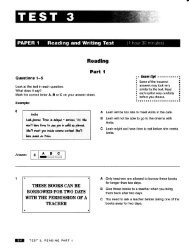
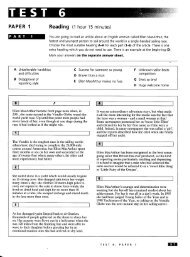
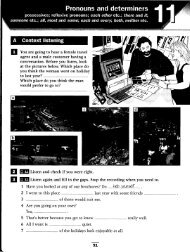
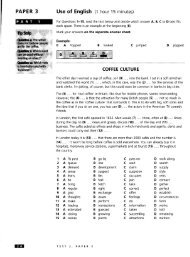
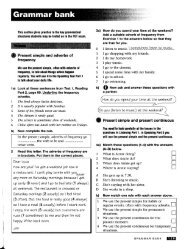
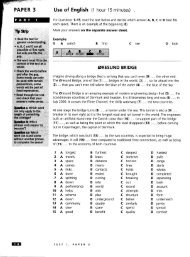
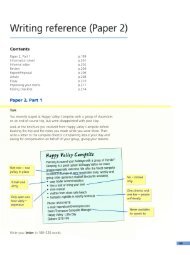

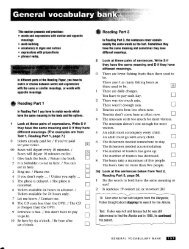
![T]NIT 9 A new look](https://img.yumpu.com/40125756/1/190x248/tnit-9-a-new-look.jpg?quality=85)
